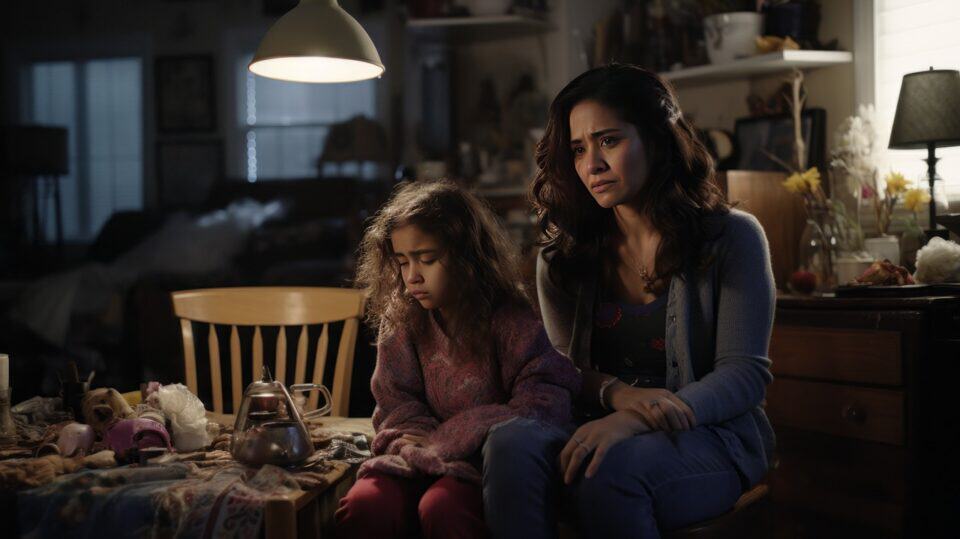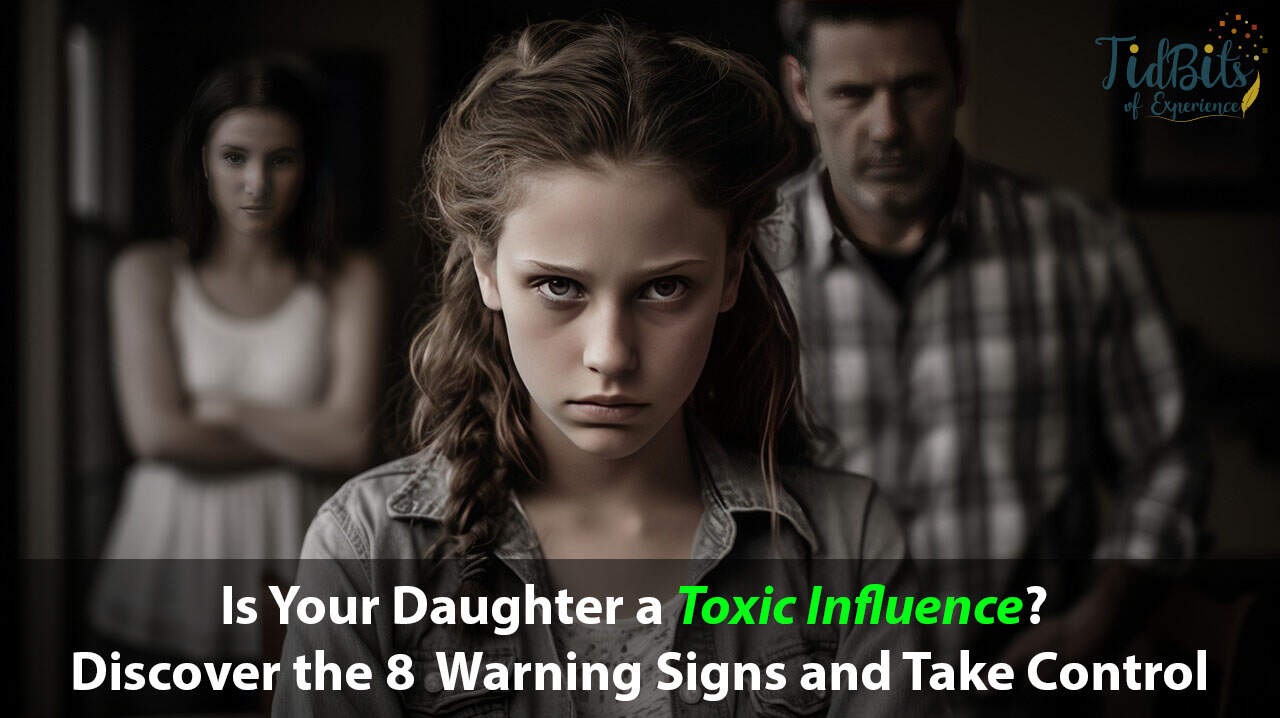Living with a toxic daughter can be an emotionally exhausting challenge many parents face. This behavior could stem from unresolved trauma or even certain personality disorders, complicating the parent-child relationship further.
Our insightful article aims to help you identify signs of toxic behavior, understand its origins, and offer effective solutions for dealing with it. Let’s navigate this difficult terrain together for better relationships and healing.
Key Takeaways
Understanding the signs of toxic behavior in a daughter, such as being overly judgmental, mean-spirited, dishonest, and disrespectful of boundaries, is crucial for parents to address and navigate this challenging dynamic.
Toxic behavior in daughters can stem from unresolved trauma, mental health conditions like bipolar disorder or PTSD, and learned behaviors. Recognizing these potential origins can provide insight into the root causes of toxic behavior.
Setting clear boundaries with a toxic daughter and seeking professional help when needed are essential steps toward healing and creating healthier relationships within the parent-child dynamic. Prioritizing one’s own well-being throughout this process is important for achieving happiness and harmony within the family.
Table of Contents
Understanding the Concept of a Toxic Person

In the realm of relationships, the term “toxic person” often signifies individuals who consistently display damaging and harmful behaviors. Driven by a need to manipulate those around them, these people thrive on eliciting emotional responses from others.
Toxicity is more than an occasional lapse in judgment or momentary slip—it becomes ingrained into their personality, shaping their very sense of self.
Primarily rooted in unresolved trauma and resentment towards caregivers or societal pressures, toxic behavior often transforms as a defense mechanism. For instance, those suffering from mental health conditions like bipolar disorder or PTSD may unknowingly adopt toxic traits as part of their coping strategy.
Additionally, exposure to negative influences during development stages can lead to the manifestation of this destructive behavior into adulthood, creating a toxic daughter-in-law or son-in-law.
Possible Reasons Behind Toxic Behavior

Toxic behavior often roots itself in a myriad of complex factors. One powerful contributor is unresolved trauma, whether from childhood or later experiences. This can manifest as toxic behavior when individuals channel their pain and harm onto others as a coping mechanism for the torment they have yet to heal from.
Furthermore, certain mental health conditions, such as bipolar disorder, post-traumatic stress disorder (PTSD), and various personality disorders, may also trigger an individual’s propensity toward toxicity.
These illnesses often distort perceptions of reality and hinder healthy communication practices, causing affected individuals to lash out in destructive ways.
Additionally, learned behavior plays a significant role in shaping one’s actions and attitudes. If someone grows up witnessing negative or toxic behaviors being rewarded or tolerated within their family environment, they are likely conditioned to behave similarly.
It’s vital to understand that these reasons don’t excuse toxic conduct but aid in gaining insight into its potential origins.
Identifying a Toxic Daughter: Key Signs

Is your daughter overly judgmental, mean-spirited, and dishonest? Learn the key signs to identify if you have a toxic daughter and how to address this toxic behavior. Read more for solutions and healing.
She is overly judgmental
Identifying an overly judgmental attitude in your daughter is a critical step in recognizing potential toxicity. This trait typically manifests through consistent criticism and comparison to others, fueling feelings of inadequacy or superiority.
Such behavior reflects signs of a toxic personality, which may be rooted in resentment or learned from negative influences like bad friends. In most cases, your daughter might not even realize her constant judgment is damaging—especially when it feels normal due to previously exhibited familial behaviors or unintentional positive reinforcement.
The goal here isn’t about accusing her of being intolerably critical; instead, it’s about understanding the dynamics that contribute to this harmful pattern and addressing them appropriately.
She displays needy behavior
Toxic daughters often exhibit needy behavior, constantly seeking attention and validation from their parents. They may rely heavily on their mothers for emotional support, unable to cope with life’s challenges independently.
This excessive neediness can be draining for the parent, as they feel obligated to fulfill their daughter’s every desire and fix all her problems. It’s important to recognize that this behavior is not a sign of genuine dependence but rather a manipulative tactic used by toxic daughters to control and dominate their parents.
By understanding the underlying motivations behind this neediness, parents can begin to establish healthier boundaries and encourage their daughter’s emotional growth and independence.
Her actions are mean spirited
Daughters who display mean-spirited actions towards their mothers can be highly toxic. They may engage in behavior such as belittling, criticizing, or embarrassing their mothers both privately and publicly.
This kind of negativity not only damages the mother-daughter relationship but also affects the overall family dynamic. It is important to address this toxic behavior because it can cause emotional harm and strain on everyone involved.
She’s dishonest and untrustworthy
A toxic daughter may exhibit dishonesty and untrustworthiness, making it difficult to rely on her words and actions. This behavior can manifest in various ways, such as lying about her whereabouts or engaging in deceptive behaviors.
It’s important to recognize that this dishonesty is not a reflection of your parenting but rather a result of her own choices and mindset. There could be underlying reasons for this behavior, including low self-esteem, the need for control, or even learned manipulative tactics from toxic influences.
Dealing with a dishonest and untrustworthy daughter requires setting clear boundaries and addressing the root causes of this behavior. By fostering open communication and encouraging honesty, you can help guide your daughter toward building trust within your relationship.
She doesn’t respect boundaries
Toxic daughters often display a blatant disregard for personal boundaries, which can cause significant emotional distress. They may invade your privacy, manipulate your emotions, and continuously push the limits of what is acceptable behavior.
This lack of respect for boundaries can leave you feeling violated and helpless. It’s important to establish clear and firm boundaries with a toxic daughter to protect your own well-being. This may involve setting limits on how much time or access she has to you, refusing to engage in conversations that cross your boundaries, and asserting yourself when she tries to manipulate or control you.
Remember, it is not selfish to prioritize your own mental health and set boundaries with someone who doesn’t respect them.
She deflects and projects her issues onto others
Toxic daughters often have a difficult time taking responsibility for their own actions and emotions. Instead of facing their issues head-on, they tend to deflect and project their problems onto others.
This means that when confronted with the consequences of their behavior, they may shift blame or make excuses, making it challenging to address the root causes of their toxic behavior. It’s crucial to recognize this pattern in order to understand that their words and actions may not reflect reality or your role in the situation.
By acknowledging this dynamic, you can begin to approach these situations with empathy while also creating boundaries for yourself.
She becomes passive aggressive
Passive aggression is a common characteristic seen in toxic daughters. Instead of directly communicating their feelings or concerns, they resort to indirect and covert behaviors to express their anger or frustration.
This can manifest through subtle remarks, backhanded compliments, giving the silent treatment, or even intentionally sabotaging plans without openly admitting it. Passive aggression creates a toxic environment where open communication becomes difficult, and conflict resolution is nearly impossible.
Understanding this behavior is important in order to address and navigate the complexities of dealing with a toxic daughter while working towards healing and establishing healthier dynamics within the relationship.
She constantly seeks attention through drama
A toxic daughter may constantly seek attention through dramatic behavior, using it as a way to manipulate and control those around her. This can manifest in various ways, such as creating unnecessary conflicts or exaggerating situations for attention.
Drama becomes her tool to keep her focus on herself and ensure that everyone’s energy is directed towards meeting her needs. It’s important to recognize this pattern of behavior and not get caught up in the drama, as giving in only reinforces the toxic cycle.
Setting clear boundaries and focusing on your own well-being are crucial steps in dealing with a daughter who seeks attention through drama. Seeking professional help can also provide guidance on how to navigate this challenging dynamic.
The Emotional Toll of Having a Toxic Daughter

Having a toxic daughter can take an immense emotional toll on parents, leaving them constantly walking on eggshells and feeling emotionally exhausted. If you want to learn more about the impact of toxic behavior and how to address it, continue reading.
Feeling like you’re walking on eggshells
Living with a toxic daughter can feel like constantly walking on eggshells, unsure of when the next explosive argument or confrontation will occur. Every interaction becomes a minefield as you try to anticipate her moods and reactions in order to avoid setting off her volatile behavior.
This constant state of hypervigilance takes a tremendous toll on your emotional well-being, leaving you exhausted and emotionally drained. The fear of saying or doing something wrong looms over your head, making it difficult to relax and enjoy even the simplest moments together.
Constant worry about fixing her issues
Constantly worrying about fixing your toxic daughter’s issues can take a heavy toll on your emotional well-being. It can consume your thoughts, leaving you feeling overwhelmed and stuck in a cycle of trying to fix something that may be beyond your control.
This constant worry adds to the emotional confusion and exhaustion already present in dealing with a toxic relationship. Remember, it is important to prioritize your own mental health and set boundaries for yourself when it comes to taking responsibility for fixing someone else’s issues.
Seek support from professionals or trusted friends who can provide guidance and help you navigate through this challenging situation.
Emotional confusion and exhaustion
Interacting with a toxic daughter can be emotionally exhausting and confusing for parents. The constant manipulation, criticism, and belittling take a toll on their mental well-being. This emotional rollercoaster can even lead to post-traumatic stress disorder (PTSD) in extreme cases.
Despite their best efforts, parents often find themselves walking on eggshells, fearing the next outburst or confrontation. They may experience feelings of helplessness and confusion as they try to navigate the toxic dynamics of their relationship with their daughter.
It’s important for parents to recognize the signs of toxicity and seek support to regain emotional balance and protect their own well-being in the process.
Steps to Address Toxic Behavior


- Keep a record of the problematic behavior exhibited by your toxic daughter.
- Take responsibility for your own role in the dynamic and reflect on how you may contribute to the toxic behavior.
- Set a positive example by modeling healthy behaviors and communication skills.
- Establish clear and firm boundaries to protect yourself from further harm.
- Communicate openly and from the heart, expressing your feelings and concerns honestly with your daughter.
- Consider seeking professional help, such as therapy or counseling, to navigate the complexities of dealing with a toxic daughter.
Create a record of problematic behavior
Documenting the toxic behavior of your daughter is an essential step in addressing and resolving the issue. By keeping a record, you have tangible evidence that helps validate your experiences and provides clarity when confronting her.
It also serves as a reminder of specific incidents and patterns of toxic behavior that can often be easily forgotten or minimized over time. This record becomes crucial when seeking professional help or discussing the situation with other family members.
Remember, having concrete examples will help you address the problem more effectively and find solutions for healing both yourself and your daughter.
Accept your part in the dynamic
Accepting your part in the dynamic is a crucial step when dealing with a toxic daughter. It’s important to acknowledge that no relationship exists in isolation, and our actions and reactions can contribute to unhealthy dynamics.
By taking responsibility for our own behavior, we open ourselves up to self-reflection and personal growth. This doesn’t mean accepting blame for all of the toxicity but rather recognizing how our own patterns and responses may have influenced or enabled the negative behaviors.
By being accountable for our part in the dynamic, we can create an opportunity for healthier communication and strive towards positive changes in the relationship.
Set a positive example
One crucial step in dealing with a toxic daughter is to set a positive example. By modeling healthy behavior, you show your daughter what it means to have respect for others, communicate effectively, and handle conflicts maturely.
This involves being mindful of your own actions and words, as children often mirror the behavior they see from their parents or guardians. Show empathy and understanding towards others, practice active listening, and demonstrate emotional resilience.
By setting a positive example, you create an environment that encourages personal growth and fosters healthier relationships within the family dynamic.
Establish healthy boundaries
Establishing healthy boundaries is a crucial step in addressing toxic behavior in your daughter. By clearly defining personal space and limits, you create a safe environment where both of you can maintain emotional well-being.
Healthy boundaries involve setting clear expectations for respectful communication, implementing consequences for disrespectful behavior, and prioritizing your own needs without guilt or manipulation.
This empowers you to protect yourself from toxic behaviors while teaching your daughter about respect, responsibility, and healthy relationships. Remember that establishing healthy boundaries may require consistent reinforcement and patience as your daughter adjusts to these new dynamics.
Communicate openly and from the heart
When dealing with a toxic daughter, effective communication is crucial in order to address the underlying issues and work toward healing. It’s important to communicate openly and from the heart, expressing your feelings honestly while staying calm and composed.
By sharing your emotions and thoughts without attacking or blaming, you create an opportunity for understanding and connection. Keep in mind that toxic behavior often stems from unresolved trauma or negative influences, so approaching the conversation with empathy can help break down walls and foster a healthier relationship.
Seeking professional help like counseling or therapy can provide guidance on how to navigate this challenging dynamic and promote effective communication strategies for long-lasting healing.
Seeking Professional Help

Seeking professional help is crucial in dealing with a toxic daughter. Here are some reasons why it can be beneficial:
- Professional therapists or counselors can provide guidance and support in navigating the complexities of the toxic relationship.
- They can offer an objective perspective on the situation, helping you gain clarity and insight into your daughter’s behavior.
- Therapists trained in trauma counseling can help address any unresolved traumas that may be contributing to your daughter’s toxicity.
- Mental health professionals can assess for any underlying mental health conditions that might be fueling your daughter’s toxic behavior, such as bipolar disorder or PTSD.
- They can assist in developing effective communication strategies and conflict resolution techniques specific to dealing with a toxic daughter.
- Therapy sessions provide a safe space for you to process your emotions, validate your experiences, and develop coping mechanisms for dealing with the emotional toll of having a toxic child.
Remember, seeking professional help doesn’t mean you’re giving up or admitting defeat. It shows strength and commitment to finding healthier ways of dealing with your toxic daughter.
Frequently Asked Questions About Dealing With a Toxic Daughter
What are the signs of a toxic daughter?
Signs of a toxic daughter may include constant criticism, manipulation, emotional blackmail, disrespect, and an inability to take responsibility for her actions. She may also exhibit controlling behavior and create a negative atmosphere within the family.
How can I address a toxic relationship with my daughter?
Addressing a toxic relationship with your daughter requires open communication, setting boundaries, and seeking professional help if needed. It’s important to express your feelings calmly and assertively while encouraging her to take accountability for her actions.
Are there solutions for healing a toxic mother-daughter relationship?
Yes, healing is possible in most cases through therapy or counseling, where both parties can work on understanding each other’s perspectives and addressing underlying issues that contribute to the toxicity. Building trust, mutual respect, and improving communication are crucial steps toward healing.
How can I take care of myself while dealing with a toxic daughter?
Taking care of yourself is essential when dealing with a toxic daughter. Set aside time for self-care activities that promote relaxation and reduce stress levels, such as meditation or engaging in hobbies you enjoy. Seek support from trusted friends or therapists who can provide guidance during challenging times.
Conclusion
In conclusion, dealing with a toxic daughter can be emotionally draining and challenging. However, by recognizing the signs of toxic behavior, setting boundaries, and seeking professional help when needed, parents can begin the journey toward healing and creating healthier relationships.
Remember to prioritize your own well-being throughout this process as you work towards finding peace and resolution in your relationship with your daughter. You deserve happiness and harmony in your life.

what encouraged you to write about toxic daughters when you have a son. Just curious.
My son recently made the decision to transition into a girl, so now he’s my daughter.
My son is dating your daughter – does that make him a gay?